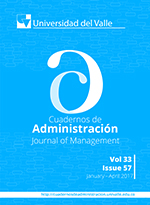Learning in the Regional Innovation Systems: An Agent Based Model
Keywords:
Aprendizaje, interacciones, capacidades, modelos basado en agentes, sistemas regionales de innovaciónMain Article Content
Learning in regional innovation systems is a complex phenomenon. Therefore, its analysis is being increasingly approached through computer-simulated strategies. The agent-based model in particular has demonstrated to be a useful approximation to overcome the limitations of other methodological strategies since it allows a more trustworthy representation of the agent’s capabilities, their reasoning limitations, of the mechanisms used for decision making, their interaction, and their success formulas to take advantage of market opportunities. Nevertheless, the development of these models represents serious conceptual and methodological challenges. This article proposes a model that represents the agents of a regional innovation system as vectors of capabilities and the learning process as the accumulation of their innovation capabilities. The proximity among agents and the influence of public policies favors the result of the interaction induced by the market. Methodologically, the development of the model starts with a conceptual proposal validated through contrast against. specialized literature. After that, a model verified by computer was elaborated and its behavior was validated. Finally, a simulation of scenarios was performed to prove its potential application. The resulting model contributes to the understanding the learning dynamics and the emerging patterns of the agent’s specialization and their influence on the system’s performance. Finally, the simulation exercises demonstrate the model’s potential to guide policy decisions that seek to improve the performance regional innovation systems.

